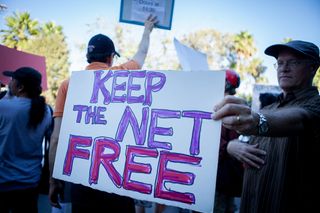The creator of the world wide web attacks the FCC's proposal to end net neutrality
Internet pioneer Tim Berners-Lee weighs in.

Yesterday Federal Communications Commission chairman Ajit Pai announced a proposal to rescind net neutrality rules that were approved by the FCC under the previous administration. That proposal will be put to a vote on May 18. In the meantime, voices can be heard on both sides of the issue, including that of the computer scientist best known for inventing the world wide web.
Yesterday, Tim Berners-Lee issued a statement outlining his position on the issue. It's short and to the point: he disagrees with Pai and the proposal. Like others who are in favor of regulating high-speed Internet as common carriers (which prevents ISPs from giving certain content preferential treatment), Berners-Lee is uncomfortable with letting Internet service providers and wireless carriers set their own rules.
"When I invented the web, I didn’t have to ask anyone for permission, and neither did America’s successful Internet entrepreneurs when they started their businesses. To reach its full potential, the internet must remain a permission-less space for creativity, innovation and free expression," Berners-Lee said.
"In today’s world companies can’t operate without internet, and access to it is controlled by just a few providers. The FCC’s announcements today suggest they want to step back and allow concentrated market players to pick winners and losers online. Their talk is all about getting more people connected, but what is the point if your ISP only lets you watch the movies they choose, just like the old days of cable?"
Berners-Lee's concerns are the same as those held by many tech outfits and consumers alike. Left unchecked, high-speed service providers could tack on fees to companies like Netflix to avoid throttling traffic. ISPs could also easily abuse that power to favor their own services.
The other side of the argument is that regulation hamstrings ISPs from investing in new technologies that could benefit consumers, such as faster infrastructures. Pai's argument is that, "the more heavily you regulate something, the less of it you're likely to get."
That said, Verizon last week announced a $1.05 billion fiber-optic deal to grow its wireless platform, so go figure.
PC Gamer Newsletter
Sign up to get the best content of the week, and great gaming deals, as picked by the editors.
You can read the entire FCC proposal, titled "Restoring Internet Freedom," right here (PDF), and we'll have more on the details of net neutrality—and its affect on PC gaming—in the coming days.
Paul has been playing PC games and raking his knuckles on computer hardware since the Commodore 64. He does not have any tattoos, but thinks it would be cool to get one that reads LOAD"*",8,1. In his off time, he rides motorcycles and wrestles alligators (only one of those is true).
Most Popular







